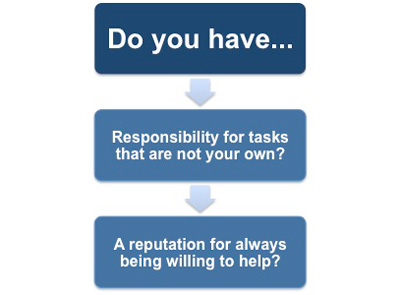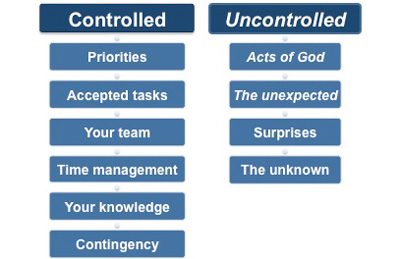Dealing With Stress at Work - Examining Your Own Behavior
The biggest contributor to stress at work is the inability to say 'no' to work requests, which results in people taking on far more work than they can realistically manage. This applies to requests from co-workers as well as bosses.
It is a natural response to want to cooperate with others and we don't want to give the impression that we are unwilling to help. At the same time, however, we must retain control of our activities so that we have sufficient time and resources to complete them to our satisfaction. Our Negotiating Workload Limits eBook provides practical strategies for reducing your workload to a manageable level whilst still being seen as a hard-working and diligent manager.
Saying 'No'
One of the major factors in developing the ability to say 'no' is to realize that if you take on things that you subsequently haven't got time to do well, then you will be letting yourself down. A job done badly will reflect poorly on you, will undermine your relationship with your boss and your co-workers, and will chip away at your personal pride and motivation.
It is always easier to agree to take on more responsibility, to be seen as keen and competent, than it is to admit that there is a problem and then to take action to remedy the situation. The culture of your organization may also be one that encourages long hours and rewards those seen to be performing in this way, making saying 'no' appear antagonistic and obstructive.
However, the long-term effects of over-work are potentially catastrophic for both your health and your career and need to be addressed, even if this means making some uncomfortable decisions in the short term.
The first thing you need to determine is whether your own behavior has contributed in any way, such as if you unintentionally encourage your co-workers to direct more than the fair share of work your way.
There are two questions that you need to ask yourself:
 |
Are You Responsible for Tasks that Aren't Really Yours?
It is quite common for people who are conscientious to volunteer to take responsibility for something that they feel is a one-off task. It may have been a favor for a co-worker or just something that needed doing for which there was no obvious candidate.
Having done it once, they then find that it has somehow unofficially become their responsibility. Tasks like these tend to accumulate over time and become a major effort to stay on top of, even though there is no time formally allocated for them and no formal recognition that you are even doing them.
Such tasks also become a threat to your ability to effectively manage your own activities, and they create serious issues regarding your ability to manage your time effectively. These distractions can then develop into a major source of stress for you.
If you answered 'yes' to this question, then you need to document these tasks and detail exactly how much time they are taking up. It may be that your boss has no idea that you are even undertaking extra tasks, never mind how time-consuming they are. How and when to deal with such distractions and whether or not you need to bring these to your boss' attention is discussed later.
Is Your Reputation that of Someone who is Always Willing to Help?
You need to examine your behavior and objectively review whether you are always the first to willingly offer to step into the void and take on an unwanted task, or is it something you do only when necessary? If you find that your behavior matches the former, then you should not be surprised that you have a high workload. You will need to examine and alter this to reduce your levels of stress caused by an excessive burden of work.
Always appearing willing to help is inextricably associated with taking on tasks that are not your responsibility. If you have in the past frequently volunteered to take responsibility for particular tasks rather than seeing them left incomplete, then it should not be surprising if your co-workers view you as someone who is always willing to help out.
Generally speaking, people are very sensitive to rejection and if you have a reputation as someone who is unlikely to reject requests for help then people will be inclined to approach you first, even if they suspect that you are over-worked. Remember this may be their way of managing their own workload!
If you answered 'yes' to this question then you need to make some changes in your relationship with your co-workers. This does not need to be particularly radical; you just need to change your own perspective from being focused on helping others, to being focused on accomplishing your own goals.
Remember, it is always easier to say 'no' to requests from co-workers than it is to say 'no' to your boss. Consequently, this should be the first area you tackle in your quest to balance your workload. Saying 'no' will probably feel very uncomfortable to begin with, but provided that you approach it in the right way, it will get easier. The best way to say 'no' is described later.
Retaining 'Control'
The extent to which you are able to control your workload will vary between different professions and industries, but in all situations you will still have an element of control over your own workload or that of your team. It is important to recognize what aspects you can control and those that you can't.
 |
You must always be mindful of how to control your workload by setting appropriate priorities for your tasks and accepting only new tasks that are either short term in nature, that replace an existing task, or offer you the opportunity to increase your knowledge or skills.
As a manager, it is extremely important that you maintain firm control of your team's workload to ensure they maintain levels of high performance and morale. You must act as their 'gatekeeper,' providing the level of protection that allows them to operate efficiently.
You are able to manage your own time and allocate resources according to your priorities. A key aspect of this is to avoid distractions from unnecessary interruptions, which occur when you don't say 'no,' or when you accept too many tasks. Part of your time management should include an element of contingency planning that enables you to absorb those aspects beyond your control.
Also, it is important that you ensure that once 'normality' has returned the responsibility for the task or project reverts back to its original owner.
It is only by being sufficiently assertive that you will retain control over the tasks and projects you accept responsibility for. It is through the art of 'negotiation' that you will ensure that you have an even workload. You will still have periods where you are given numerous assignments, which will give you that adrenalin rush and challenge, but the pressure will not be constant.
By exhibiting assertive behavior in a positive and constructive way, you will improve your own self-esteem and morale. You will also gain the respect of your boss and co-workers as someone who is a 'team player' not a doormat. You will also be able to coach any members of your team to adopt the same positive behaviors.
You may also be interested in:
Dealing With Stress at Work | Negotiating with Your Boss and Colleagues | Learning to Say 'No'.



